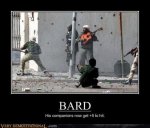The 2e bard was basically a hodge-podge of thief abilities and wizard spells. When they finally got their spells, they progressed faster than a wizard which was nice for a few levels since their experience requirement was much lower. However, they couldn't even wear the armor they were proficient in if they wanted to cast their spells.
The 3.5e was incredibly weak, easily the lowest tier class, but it was certainly an improvement in flavor. Though that meant they didn't even get to throw around fireballs like its 2e counterpart. The bardic abilities no way made up for the fact that they were a subpar spellcaster class.
I disregard everything 4e.
This is straight up wrong, variant.
You presumably don't know much about tiers in 3.XE. Bard is a solid-to-high T3. You sneer about obscure PrCs and Feats, but that's enough to take Bards to T2! For god's sake! T2! If you demand T1, you should know that ONLY full casters got that status, and not even all of them! T2 is pretty crazy. T3 is where most good-but-not-overpowered classes lived.
So no, they are not "lowest tier". Not easily. Not at all. Not even slightly. You need to accept your error, there.
2E Bards were an extremely strong class, and their armour limitations were no worse than any multiclass Mage (by the time the Elf F/M had Elven Chain, you probably had Bracers of Defense or a Ring of Protection). In practice every DM I ever heard of let them cast in armour, though, and I believe Dragon magazine even recommended it (can't remember what the Bard's Handbook had to say). They levelled so fast that they challenged the Wizard for highest level spell they could cast.
You say when they "finally" got their spells. They got their spells AT LEVEL 2. If that's too long to wait, on Rogue XP, god freakin' help you. That's not "finally".

That's weird.
4E you "disregard", but it still happened. And the Bard in it was great. No possible major complaints great.
Personally, I like the fact the bard actually has a real niche without being a "me too" 3rd wheel. I guess the 4e bard had that as well (and the 2e one could fake it for a few levels due the the oddness or rogue Xp charts and spellcasting). Still, its nice to have a bard that feels like he could replace a core member rather than emulate it badly.
I honestly feel like that's never really been a problem for Bards except in 3E having played them in every edition except 1E. In 2E, they were tremendous. I was the goddamn boss of the party most of the time, playing one. I fought, I cast spells, I influenced NPCs, I identified stuff, etc. etc. - no way was I "emulating badly". 3E. Yeah. Yeah. Hmmm. Not so much. Just kind of terrible at everything. 3.5E/PF, though? Much better, much more solid, actually feels like you have a niche - not a great one, but still decent. 4E completely solid, not a trace of "emulating badly".
So... I do like the 5E Bard, but I don't really like the focus on spellcasting or the slightly boring spell list, and the fact that they cut his ability to buff the party (as opposed to single specific members for single actions) during combat out entirely for the first time, what, ever? COMPLETELY TERRIBLE. As discussed elsewhere, Bless, L1 Cleric spell (and thus spammable) gives 3+ party members +1d4 to hit and save on ALL attacks and saves for the WHOLE combat, so you'd think Bards, who were previously typically granting similar bonuses to a Bless spell, would get an ability like that, or just that, or just another spell which was similar? But you'd be wrong!
Unless they've changed it again - but it seems really unlikely.
If you've ever seen Gamers 2, there's a line in there that kind of summarizes this for me. The Bard is playing his lute and standing at the back of the party. One of the PCs says "God dammit, man, HELP!" and the Bard says "I *AM* helping!".
I'd prefer a Bard whose entire purpose wasn't to use nothing but one ability every combat. And especially not to have that ability be "I play my instrument...look at all the bonuses the rest of you get".
Not only did it almost never add up mathematically(It was almost always a better idea to attack with your weapon than to give bonuses to the rest of the party), but it seems silly that in character ANYONE would consider playing an instrument to be as useful as actually fighting.
I don't mind a character who inspires but doing it continuously and doing it by playing music...not sure about that.
This is complete untrue, Majoru, and Gamers 2 was apparently written by people who know nothing about D&D.
2E. You orate or sing. You don't play a goddamn instrument to grant the bonus.
3.5E You SING. SING. SING. Not play a goddamn instrument. Right here:
http://www.d20srd.org/srd/classes/bard.htm#inspireCourage
Pathfinder: You do whatever you want so long as it's perform - it's not even specified - Oratory, Acting, Singing - Instrument if you want, but no-one is making you.
4E. You sing, or orate, or whatever the hell you want.
So how about we don't spread really lazy and inaccurate lies about Bards in front of people who know more about Bards than you do?





